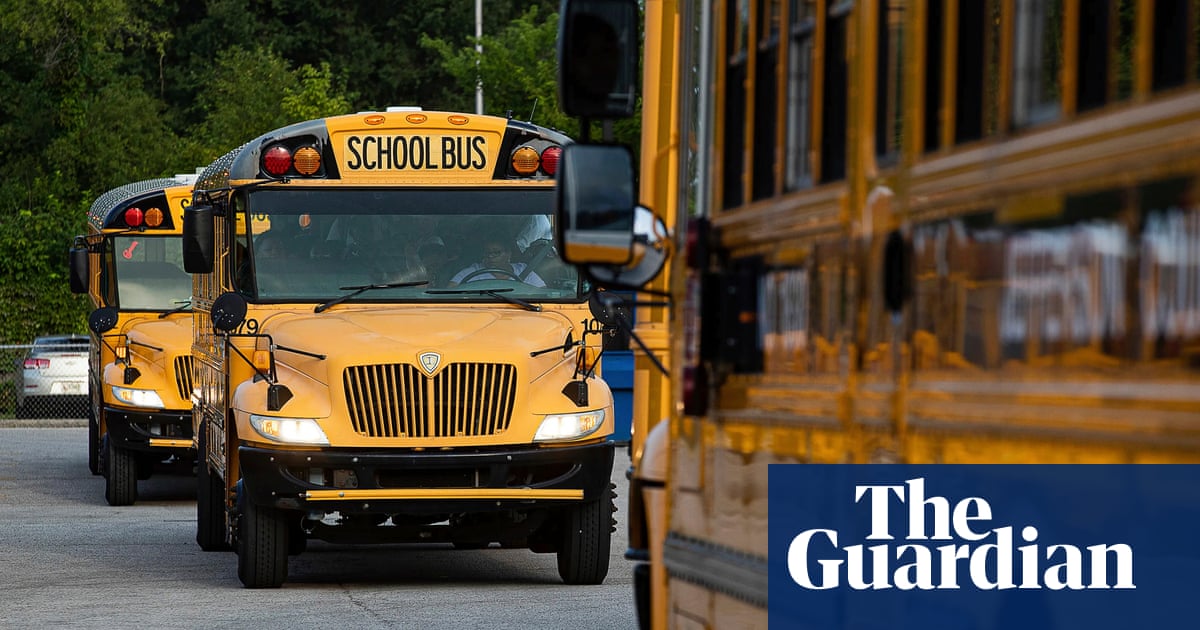Keri Heath - Hays CISD releases video from deadly Tom Green Elementary school bus crash:
https://www.statesman.com/story/news/education/2024/03/27/tom-green-elementary-school-bus-accident-crash-hays-texas-video-released/73125172007/
#BastropCounty #Texas #TomGreenElementary #HaysCISD #Schoolbus #RolloverCrash #Rollover #StopCrashing #Tragedy #TrafficCrash #TrafficSafety #Traffic #Transportation
People
Circles
Posts
The Guardian - Ohio school bus crash kills one child and injures 23 others:
https://www.theguardian.com/us-news/2023/aug/22/ohio-school-bus-crash
#TrafficCrash #Lawrenceville #Ohio #Schoolbus #Seatbelts #Tragedy #CarViolence #StopCars #TrafficSafety #Transportation
Jan 10th, 2022, 12:49 pm
SCOTUS to Decide Whether Florida Can Take $300,000 in Settlement Funds Meant for Woman in Vegetative State and Offset Medicaid Expenses
The Supreme Court of the United States heard oral arguments Monday in Gallardo v. Marstiller, a case that asks the justices to set a clear rule as to whether states can recoup Medicaid payments through tort victims’ settlement payouts.
Gianinna Gallardo was 13 in 2008 when she was hit by a pickup truck after getting off a schoolbus. Gianinna’s tragic injuries placed her in a vegetative state, where she remains to this day. Her parents filed a lawsuit against the truck driver, the trucking company, and the school district, and were awarded an $800,000 settlement meant to pay for both past and future medical care. Florida’s Medicaid agency — the entity that paid for most of Gianinna’s treatment — sought to recover $300,000 of that settlement as reimbursement for past medical expenses.
The U.S. Court of Appeals for the 11th Circuit allowed Florida to pursue the $300,000. However, as the Gallardos argue, many other jurisdictions (including the Florida Supreme Court) would not allow Florida to invade the Gallardos’ compensatory legal settlement. The main point at issue is whether the Medicaid statute allows Florida to “recover” for payments not yet made for future medical expenses. Florida argues that although the settlement was partially earmarked for future expenses, it is at least entitled to compensation for those payments already made.
The U.S. Department of Justice (DOJ) filed an amicus brief in the case supporting the Gallardos’ position.
During Monday’s oral arguments, the justices seemed somewhat receptive to the Gallardos’ argument, considering at length possible statutory interpretations that would foreclose Florida from going after a tort victim’s settlement.
Attorney Bryan S. Gowdy participated on behalf of the Gallardo family, arguing that Florida’s interpretation of the applicable statute would “lead to absurd results.”
Justice Elena Kagan, however, offered an alternative reading of the statute, asking Gowdy whether the law might not be read to distinguish between expenses Medicaid does and does not pay, as opposed to those in the past versus those in the future.
Justice Stephen Breyer presented a hypothetical similar to the Gallardo case, in which which an individual injured in an accident was compensated for both injuries and property damage. If Florida seeks reimbursement for expenses paid out from the portion of the settlement seemingly earmarked for future expenses, it may well be able to do so. “One problem for you,” Breyer remarked to Gowdy, “is that the statute says it can.”
Justice Neil Gorsuch raised an issue that, if persuasive, could give the justices an opportunity to avoid deciding the case altogether. Gorsuch pointed out that while most questions about the Medicaid statute raise disputes between the federal government and the states, the current case involves the claim of an individual. Calling the case one that “has a different light,” Gorsuch wondered whether the Gallardos’ §1983 claim should really be permitted to go forward at all. Gorsuch acknowledged that Florida has forfeited that particular issue, but commented, “I just don’t know.”
Assistant to the Solicitor General Vivek Suri arguing as an amicus on behalf of the Biden Administration characterized Florida’s position: “The state is not going after the tortfeasor, but going after the victim.”
When the court turned to hear the arguments of Florida Solicitor General Henry C. Whitaker, the justices explored multiple questions as to how Florida would read the applicable statutes.
Justice Clarence Thomas raised the same question to all three arguing attorneys: what is the difference between the Medicaid reimbursement at issue and a similar reimbursement of child support payments. Whitaker responded to Thomas by saying the analogy makes no sense.
Justice Brett Kavanaugh pressed Whitaker on his logic, pointing out that Florida appears to be encouraging a literal reading of the statute without context, but later argues context is necessary for other purposes.
Kagan continued further, asking whether Florida contends that the state could demand reimbursement for expenses it had not actually paid. Whitaker argued that because Medicaid has a priority of recovery, it should be entitled to pursue its claim.
Justice Sonia Sotomayor appeared the most overtly skeptical of Florida’s argument. As is often Sotomayor’s practice, she inquired about the practical results of siding with Florida. “Why should any of the recipients bother to sue for what you’re going to be paid. If you’re going to take it all anyway?” she asked.
Whitaker answered that tort claimants would still have “substantial incentive” to bring lawsuits to recover damages other than those that could later be claimed by Medicaid.
Courtroom tensions Monday were noticeably cooler than during Friday’s arguments over the Biden Administration’s vaccine regulations. Still, the justices did not provide any obvious indications of their leanings in the case as they grappled with adopting a cohesive framework for interpreting the Medicaid statutes.
https://lawandcrime.com/supreme-court/scotus-to-decide-whether-florida-can-take-300000-in-settlement-funds-meant-for-child-in-vegetative-state-and-offset-medicaid-expenses/
Videos
People
Circles
Videos
Posts
Keri Heath - Hays CISD releases video from deadly Tom Green Elementary school bus crash:
https://www.statesman.com/story/news/education/2024/03/27/tom-green-elementary-school-bus-accident-crash-hays-texas-video-released/73125172007/
#BastropCounty #Texas #TomGreenElementary #HaysCISD #Schoolbus #RolloverCrash #Rollover #StopCrashing #Tragedy #TrafficCrash #TrafficSafety #Traffic #Transportation
The Guardian - Ohio school bus crash kills one child and injures 23 others:
https://www.theguardian.com/us-news/2023/aug/22/ohio-school-bus-crash
#TrafficCrash #Lawrenceville #Ohio #Schoolbus #Seatbelts #Tragedy #CarViolence #StopCars #TrafficSafety #Transportation
Jan 10th, 2022, 12:49 pm
SCOTUS to Decide Whether Florida Can Take $300,000 in Settlement Funds Meant for Woman in Vegetative State and Offset Medicaid Expenses
The Supreme Court of the United States heard oral arguments Monday in Gallardo v. Marstiller, a case that asks the justices to set a clear rule as to whether states can recoup Medicaid payments through tort victims’ settlement payouts.
Gianinna Gallardo was 13 in 2008 when she was hit by a pickup truck after getting off a schoolbus. Gianinna’s tragic injuries placed her in a vegetative state, where she remains to this day. Her parents filed a lawsuit against the truck driver, the trucking company, and the school district, and were awarded an $800,000 settlement meant to pay for both past and future medical care. Florida’s Medicaid agency — the entity that paid for most of Gianinna’s treatment — sought to recover $300,000 of that settlement as reimbursement for past medical expenses.
The U.S. Court of Appeals for the 11th Circuit allowed Florida to pursue the $300,000. However, as the Gallardos argue, many other jurisdictions (including the Florida Supreme Court) would not allow Florida to invade the Gallardos’ compensatory legal settlement. The main point at issue is whether the Medicaid statute allows Florida to “recover” for payments not yet made for future medical expenses. Florida argues that although the settlement was partially earmarked for future expenses, it is at least entitled to compensation for those payments already made.
The U.S. Department of Justice (DOJ) filed an amicus brief in the case supporting the Gallardos’ position.
During Monday’s oral arguments, the justices seemed somewhat receptive to the Gallardos’ argument, considering at length possible statutory interpretations that would foreclose Florida from going after a tort victim’s settlement.
Attorney Bryan S. Gowdy participated on behalf of the Gallardo family, arguing that Florida’s interpretation of the applicable statute would “lead to absurd results.”
Justice Elena Kagan, however, offered an alternative reading of the statute, asking Gowdy whether the law might not be read to distinguish between expenses Medicaid does and does not pay, as opposed to those in the past versus those in the future.
Justice Stephen Breyer presented a hypothetical similar to the Gallardo case, in which which an individual injured in an accident was compensated for both injuries and property damage. If Florida seeks reimbursement for expenses paid out from the portion of the settlement seemingly earmarked for future expenses, it may well be able to do so. “One problem for you,” Breyer remarked to Gowdy, “is that the statute says it can.”
Justice Neil Gorsuch raised an issue that, if persuasive, could give the justices an opportunity to avoid deciding the case altogether. Gorsuch pointed out that while most questions about the Medicaid statute raise disputes between the federal government and the states, the current case involves the claim of an individual. Calling the case one that “has a different light,” Gorsuch wondered whether the Gallardos’ §1983 claim should really be permitted to go forward at all. Gorsuch acknowledged that Florida has forfeited that particular issue, but commented, “I just don’t know.”
Assistant to the Solicitor General Vivek Suri arguing as an amicus on behalf of the Biden Administration characterized Florida’s position: “The state is not going after the tortfeasor, but going after the victim.”
When the court turned to hear the arguments of Florida Solicitor General Henry C. Whitaker, the justices explored multiple questions as to how Florida would read the applicable statutes.
Justice Clarence Thomas raised the same question to all three arguing attorneys: what is the difference between the Medicaid reimbursement at issue and a similar reimbursement of child support payments. Whitaker responded to Thomas by saying the analogy makes no sense.
Justice Brett Kavanaugh pressed Whitaker on his logic, pointing out that Florida appears to be encouraging a literal reading of the statute without context, but later argues context is necessary for other purposes.
Kagan continued further, asking whether Florida contends that the state could demand reimbursement for expenses it had not actually paid. Whitaker argued that because Medicaid has a priority of recovery, it should be entitled to pursue its claim.
Justice Sonia Sotomayor appeared the most overtly skeptical of Florida’s argument. As is often Sotomayor’s practice, she inquired about the practical results of siding with Florida. “Why should any of the recipients bother to sue for what you’re going to be paid. If you’re going to take it all anyway?” she asked.
Whitaker answered that tort claimants would still have “substantial incentive” to bring lawsuits to recover damages other than those that could later be claimed by Medicaid.
Courtroom tensions Monday were noticeably cooler than during Friday’s arguments over the Biden Administration’s vaccine regulations. Still, the justices did not provide any obvious indications of their leanings in the case as they grappled with adopting a cohesive framework for interpreting the Medicaid statutes.
https://lawandcrime.com/supreme-court/scotus-to-decide-whether-florida-can-take-300000-in-settlement-funds-meant-for-child-in-vegetative-state-and-offset-medicaid-expenses/




